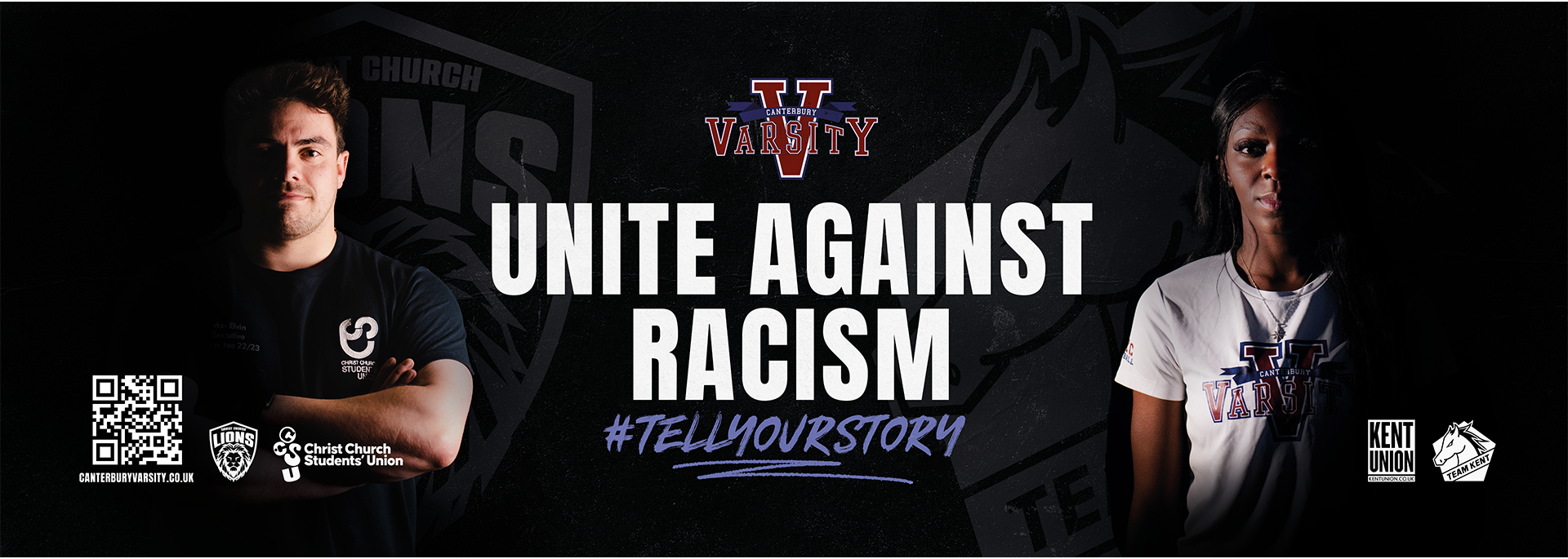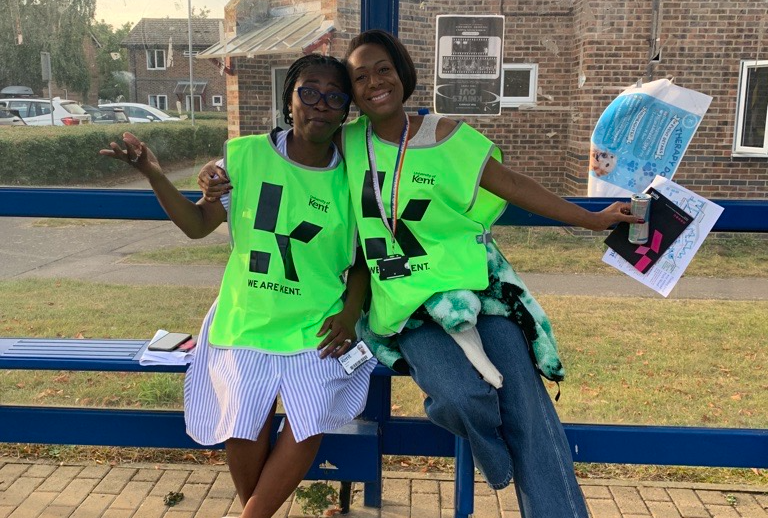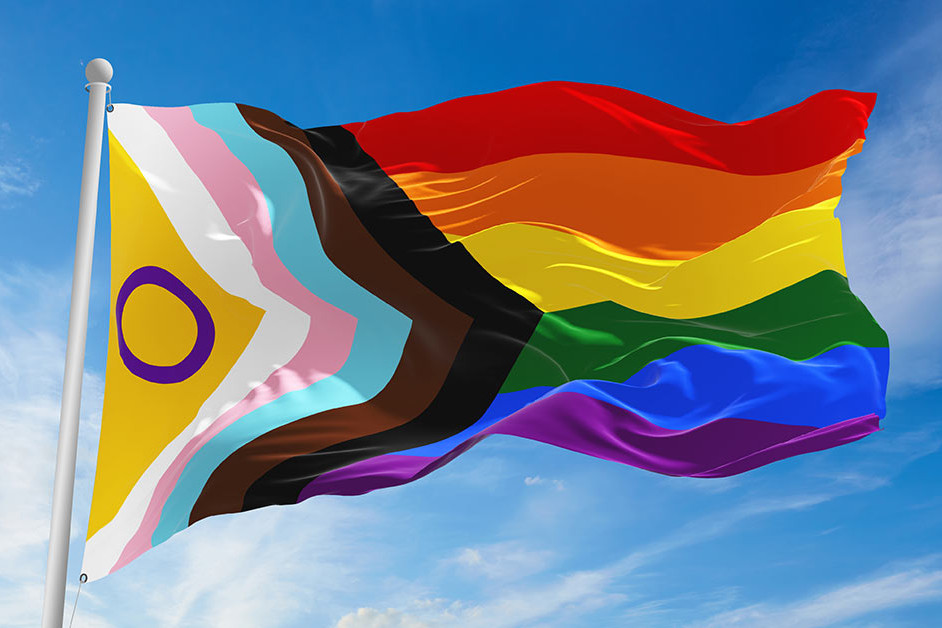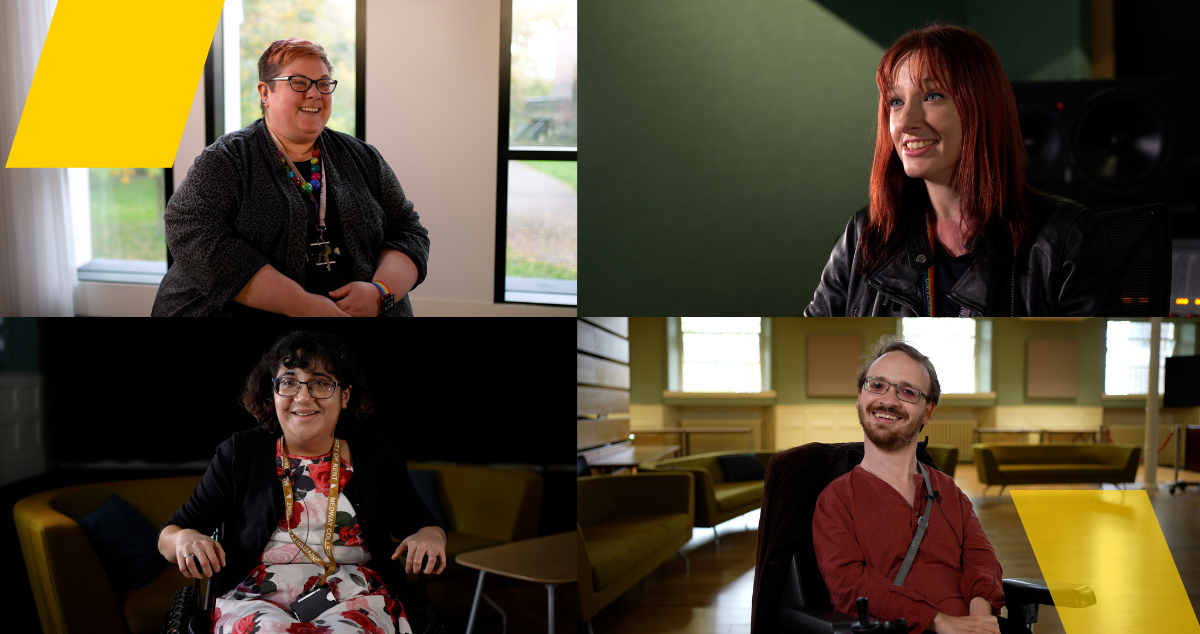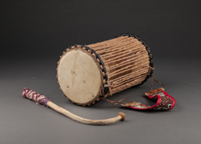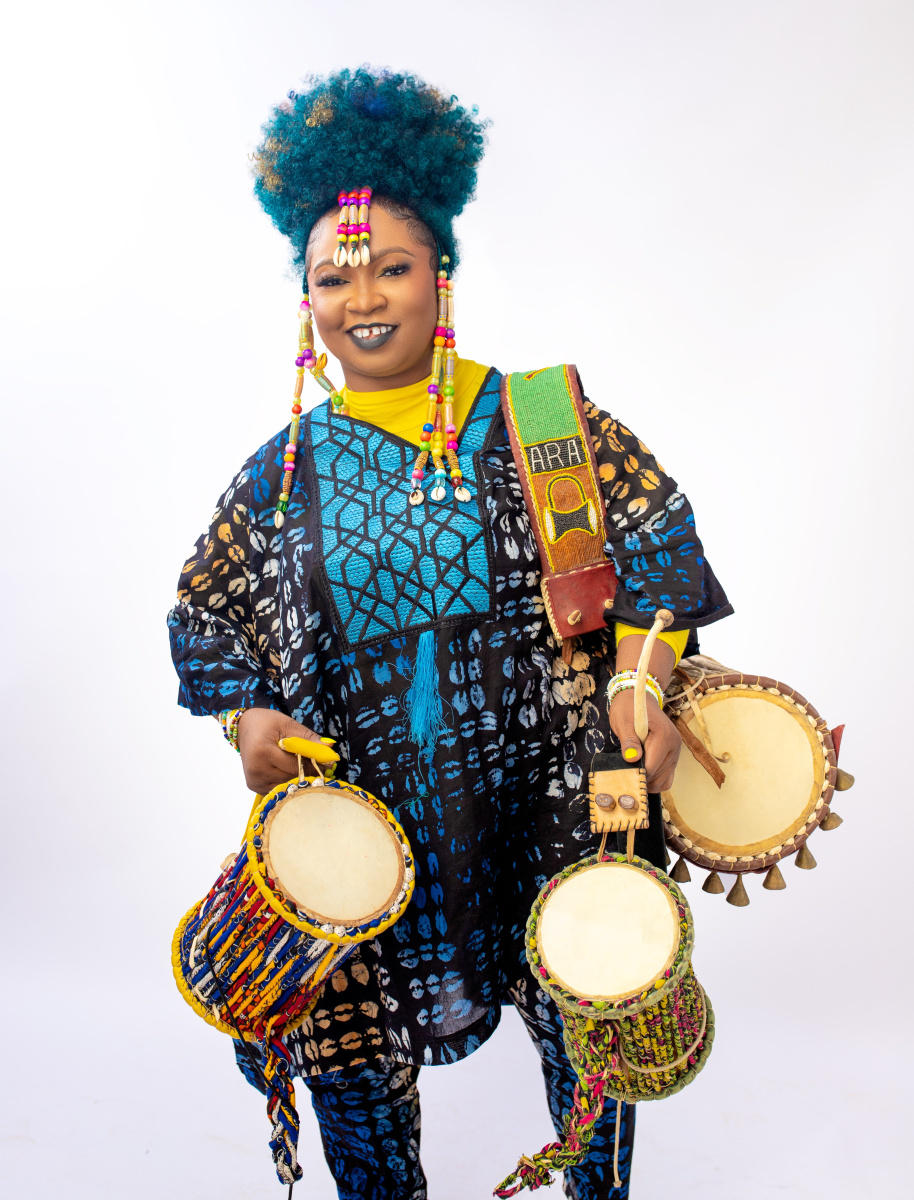At Pride celebrations at Kent, at Pride marches and Pride festivals you may have seen several flags being flown, wrapped around bodies, worn as capes or represented on posters and flyers, as banner images on websites or popping up on your social media feeds.
There are many flags, and each one represents a specific community of people. This blogpost will give you a bit more information about the some of the different flags you are likely to come across so that you can identify them and understand a little more about the deeper meaning behind each one, and why they are so important to students and colleagues who work and study at Kent.
We normally fly these flags on the flagpoles on the top of our buildings, however the recent bad weather and storms has unfortunately damaged the poles and their pulley mechanisms. We are working hard to get them repaired in time for Pride Month in June.
Rainbow Flag

The original Rainbow Flag is a symbol of LGBTQIA+ pride and the LGBTQIA+ social movements. It was created by artists Gilbert Baker, Lynn Segerblom and James McNamara in 1978 and was first flown at the San Franciso Gay Freedom Day Parade on June 25. The original design had eight colours, starting with hot pink on the top, with each colour having a specific meaning, although most variants today show the flag with the traditional six colours of a rainbow, with red always on the top. The original eight colour represented (from top to bottom); hot pink (sex), red (life), orange (healing), yellow (sunlight), green (nature), turquoise (magic), indigo (serenity), violet (spirit).
Over the years the original Pride flag has been redesigned to become more inclusive.
Intersex Progress Pride Flag
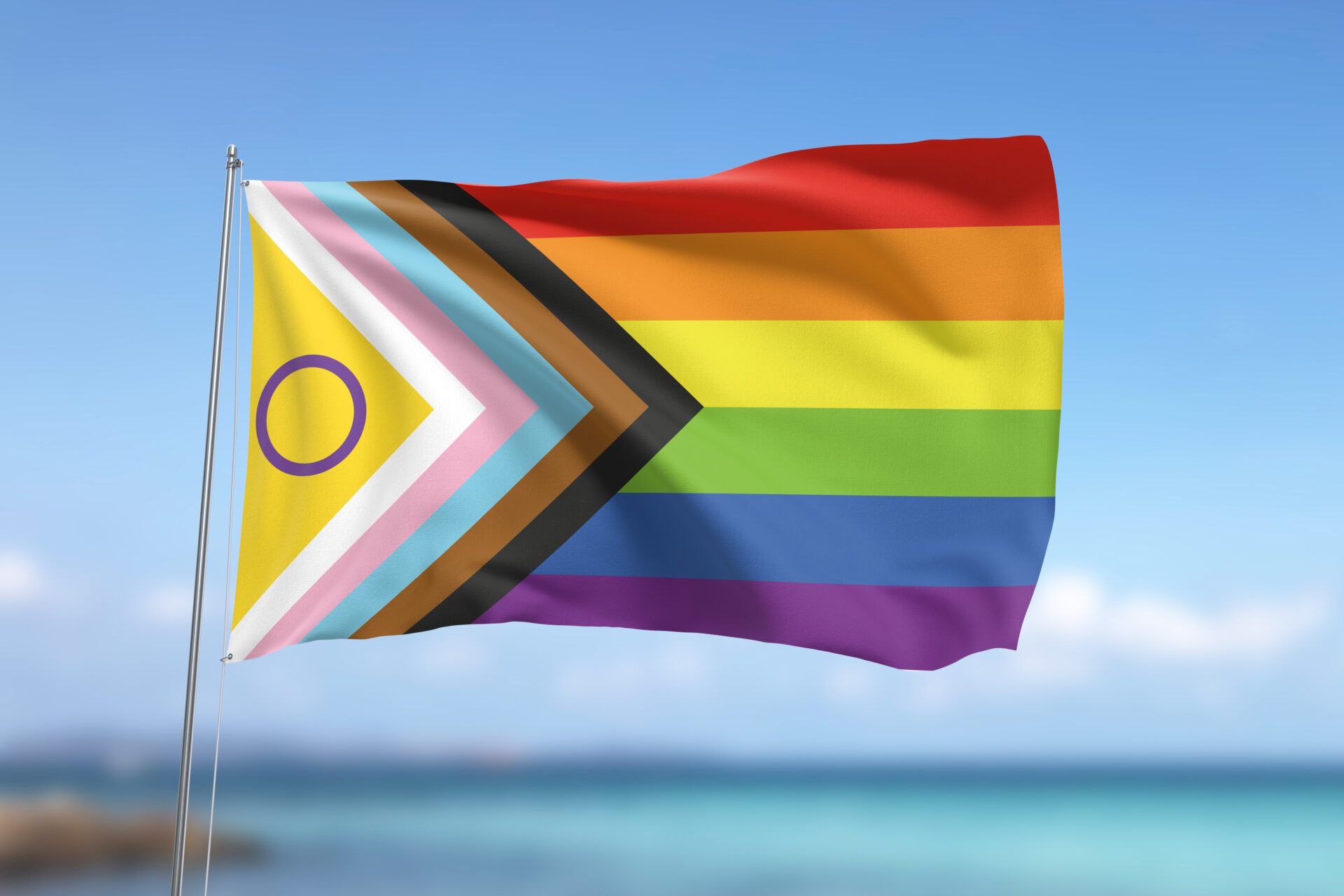
The Intersex Progress Pride Flag is currently the most inclusive flag for the LGBTQIA community, with the colours, chevrons and circle all having a specific meaning. We normally fly it above our central administration building (the Registry) and it is the flag flown on the only flagpole at our Medway site. It is also the giant flag you will see on the side of the Jarman building all year round.
In 2017, Philadelphia’s Office of LGBT Affairs added black and brown stripes to the original Rainbow Pride flag to recognise people of colour. One year later, an artist called Daniel Quasar released a redesign of the Pride flag, called the Progress Pride flag, which was widely shared on social media. It included black and brown stripes (to represent marginalised people of colour in the LGBTQIA+ community), pink, pale blue and white stripes (to represent the trans community), and also represents those living with HIV and AIDS. Quasar explained that “the arrow points to the right to show forward movement, while being along the left edge shows that progress still needs to be made”.
In 2021, Valentino Vecchietti of Intersex Equality Rights UK, shared an updated version to the Progress Pride flag, which included a yellow triangle and purple circle to represent the intersex community, creating the Intersex Progress Pride Flag that we fly at Kent today.
Bi Pride Flag
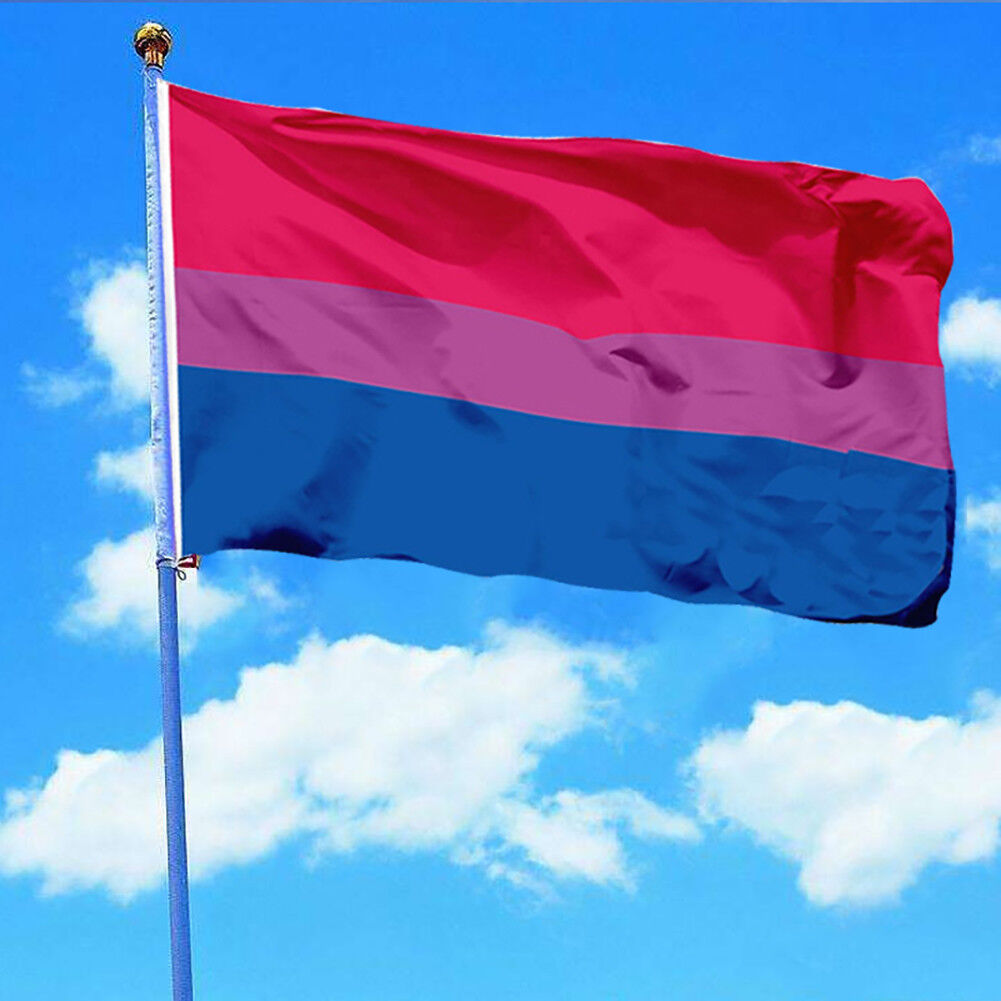
Featuring three horizontal bars, two fifth pink, one fifth purple and two fifths blue, the bisexual flag is a pride flag representing bisexuality, bisexual individuals and the bisexual community. The pink stripe represents attraction to the same gender, while the blue stripe represents attraction to the opposite gender. The purple stripe, the resulting “overlap” of the blue and pink stripes, represents attraction to all genders, including non-binary people and those of other gender identities.
The flag was designed by Michael Page in 1998 to increase the visibility of bisexuals among society as a whole and within the LGBTQIA+ community. He aimed to give the bisexual community a symbol that is comparable to the rainbow flag for the greater LGBT community.
Transgender Pride Flag
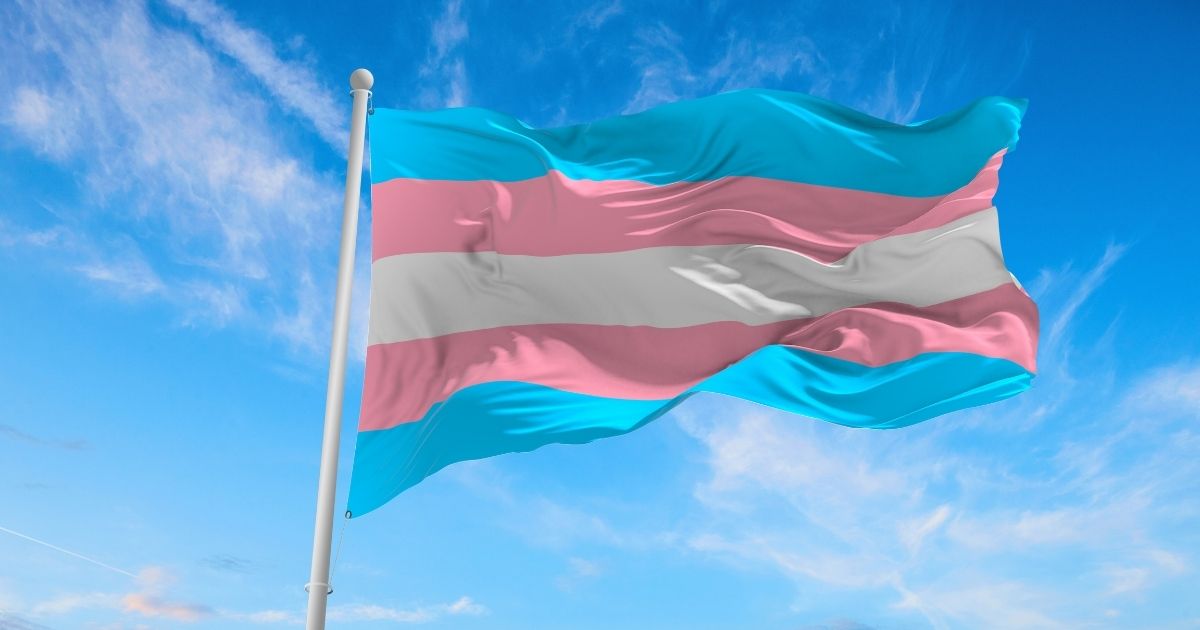
Possibly the most recognised transgender flag design is the “Transgender Pride Flag”, used as a symbol of transgender pride and diversity, and transgender rights. The flag was created by American trans woman Monica Helms in 1999 and was first shown at a pride parade in Phoenix, Arizona, in 2000. Helms describes the meaning of the transgender pride flag as: “the stripes at the top and bottom are light blue, the traditional masculine color. The stripes next to them are pink, the traditional feminine color. The stripe in the middle is white, for those who are transitioning or consider themselves having a neutral or undefined gender “.
At Kent we normally fly it above Keynes College as this is the home of our transgender staff and student support group, run by the Canterbury Trans Network.
Lesbian Stripe Pride Flag
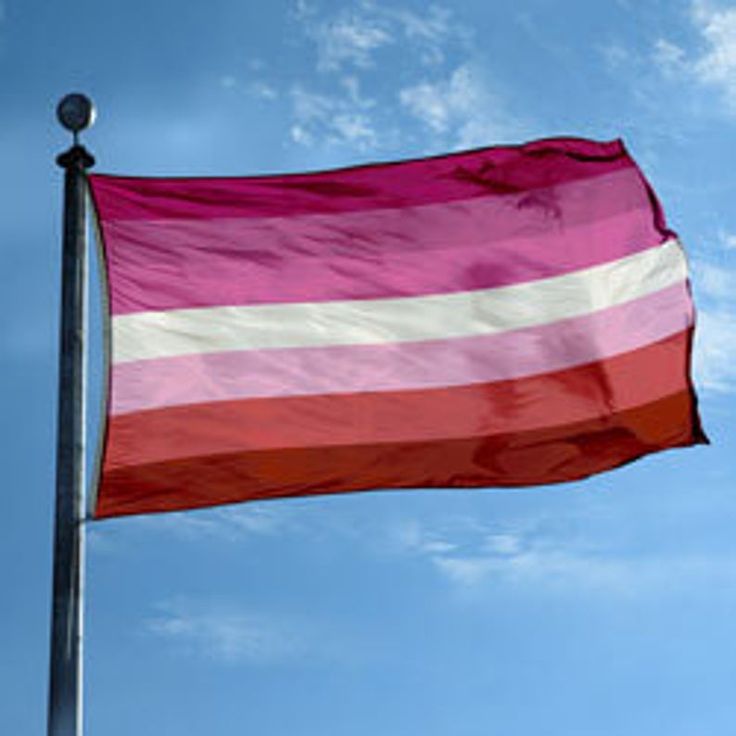
The “pink” lesbian flag was derived from the colours of the lipstick lesbian flag (created by the writer of the weblog This Lesbian Life in 2010), with the kiss mark excluded. The pink flag attracted more use as a general lesbian pride flag than the Lipstick Kiss flag. The design comprises of seven stripes consisting of six shades of red and pink colours and a white bar in the centre.
The Lesbian Stripe flag (also known as the Lipstick Flag) isn’t without its controversies, with the most common concern being that it only represents feminine presenting lesbians and has the potential to exclude butch, non-femme and androgynous lesbians.
Gender Queer Pride Flag

Marilyn Roxie, an advocate, and genderqueer writer, designed the genderqueer pride flag in 2011. The flag has three colours and three stripes.
- Lavender, created from a mix of pink and blue, which have traditionally stood for men and women, expresses queer identities and androgyny.
- White represents gender-neutral and agender identities.
- Chartreuse represents identities that aren’t in the gender binary as well as the third gender.
A genderqueer person does not subscribe to conventional gender distinctions but still identifies with neither, both, or a combination of male and female genders. The term genderqueer is similar to non-binary, but has a slightly different meaning and is best considered an umbrella term to cover any identity that isn’t cisgender.
Non-Binary Pride Flag

The Non-Binary Flag is used to represent individuals who do not identify strictly as male or female. The flag consists of four horizontal stripes of equal width. The yellow represents those who identify outside of the gender binary, the white represents people who identify as many or all genders, the lavender represents a combination of male and female genders and the black represents an absence of gender. It was designed by Kye Rowan in February 2014 when they were 17 years old.
Both the Genderqueer and Non-Binary Flags contain the colour lavender in reference and respect to LGBTQ+ history. A 1935 dictionary of slang included the phrase “a streak of lavender”, meaning a person who was regarded as effeminate. A different-gender marriage where both parties were assumed to be gay was called a Lavender Marriage. The Lavender Scare was a moral panic in the mid-20th century were LGBTQ+ people were dismissed en-masse from their jobs within the United States government. Expressions used by the LGBTQ+ community are sometimes referred to as Lavender Linguistics.
Asexual Pride Flag

In 2010 the first Asexual Pride flag was formally announced. The final design, created by AVEN (Asexuality Visibility and Education Network) user ‘standup’ was selected due to receiving the most votes in an online, open-access poll. The flags consists of four horizontal stripes, with Black at the top for asexuality, grey for grey-asexuality (the spectrum between asexuality and non-sexuality / allosexuality), white for allosexuality and purple for community. The Flag is commonly used as a representation for asexuality as a whole.
